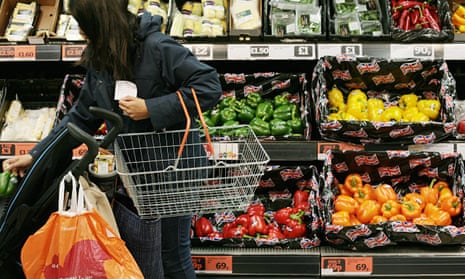Sainsbury’s has suffered its worst sales performance since the 1990s over the past three months, as Tesco shows signs of recovery in a supermarket price war which has tipped the grocery industry into deflation for the first time in more than a decade.
Sainsbury’s, which recently cut prices on branded goods, saw its sales slide by 3.1%, a considerable step back from the 1.8% recorded in September, according to analysts at Kantar Worldpanel, an international market research company.
Fraser McKevitt, Kantar’s head of retail and consumer insight, said the performance was the worst recorded by Sainsbury’s since it began monitoring supermarket sales in the 1990s. He said the results were in the context of a tough market and set against a strong trading period for the supermarket group last year.
Like-for-like grocery prices for the industry fell 0.2% in the 12 weeks to 12 October, the first period of deflation since Kantar began recording price changes in 2006, as all the major grocers attempt to challenge the rise of the discount chains Aldi and Lidl.
The German-owned chains achieved double-digit sales growth over the period, with Aldi’s sales up 27.3% and Lidl’s 18.1% higher. Tesco’s market share is 28.8%, down more than 1% on a year ago.
Sainsbury’s and Morrisons have also lost market share, to 16.1% and 11% respectively, widening the gap with Asda, the only one of the big four to gain market share year on year. Asda controls 17.3% of the market.
Waitrose had a strong start to the autumn, with sales up 6.8% to increase its market share to 5.2%, comfortably ahead of nearest rival, Aldi, which has increased its market share by 1 percentage point year on year to 4.8%.
Of the big four, only Asda achieved sales growth over the period, with sales up 1%. McKevitt said shoppers were lured by the supermarket chain’s consistent message on price. “The message is not complicated and it hasn’t changed and shoppers have rewarded that,” he said.
The poor performance for Sainsbury’s is likely to ramp up pressure on its new chief executive, Mike Coupe. It is the latest sign of deterioration at the chain, which recorded its third quarter of declining sales this month after three years of growth.
Coupe, who took the reins from longstanding boss Justin King in July, has been criticised for reducing loyalty card rewards, poorly presenting price cuts on branded items, and excluding Tesco from the Sainsbury’s brand match promotion to focus on Asda.
In his first presentation to the City this month, Coupe said he was undertaking a review of the business as supermarkets faced the most challenging times he had seen in his 30-year career.
Tesco has continued to lose sales and market share, according to Kantar. But there are signs of hope for the new chief executive, Dave Lewis, as the UK’s biggest supermarket has seen an increase in trading, with sales down by 3.6%, an improvement on the 4.5% drop recorded in September.
Morrisons dipped, with sales down 1.8%, compared with a 1.3% drop a month before.

Comments (…)
Sign in or create your Guardian account to join the discussion